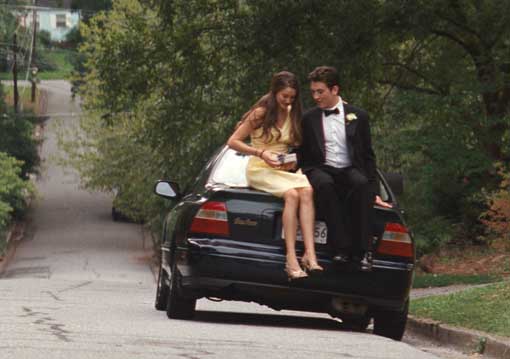Following the recent trend of recent coming of age films, The Spectacular Now, authentically depicts a story of young love that has captured viewers’ attention.
I don’t want to jinx it, but the coming of age film genre has been experiencing a sort of Renaissance period lately in recent years. Films like Juno, Submarine, The Way Way Back, and The Perks of Being a Wallflower prove that there is still opportunity for an authentic and fresh take on the popular genre. The Spectacular Now, directed by James Ponsoldt, achieves this same authenticity.
The film takes us to an unspecified very small town, where there is not much excitement for young people except drinking alcohol in the middle of the forest. It is in this town we find the two main characters, high school Seniors Sutter Keely (Miles Teller), a fast-talking, popular, and borderline alcoholic, and Aimee Finecky (Shailene Woodley), a smart, quiet, slightly awkward girl, both on the verge of graduation. Sutter and Aimee’s paths cross one day, and Sutter realizes Aimee could help him pass the classes he needs to graduate. Eventually, a relationship blooms, but with the imminent future of post-high school life ahead, Aimee and Sutter struggle to find a solution to their divergent paths.
The success of the film owes itself largely to the excellent, authentic acting of the entire cast. Teller’s Sutter lights up the screen with his personality, and he and Woodley exhibit strong chemistry. The supporting actors provide a strong background to Sutter and Aimee’s relationship; Brie Larson is fantastic as Sutter’s ex-girlfriend Cassidy, and Jennifer Jason Leigh (of the 1982 teen coming of age film Fast Times at Ridgemont High) and Andre Royo, as Sutter’s mother and teacher respectively, prove that adult characters in teen films can be more than mere caricatures.
The film is devoid of many special effects and includes naturalistic cinematography, which allows the audience to focus on the intimacy of the characters. I appreciate Woodley’s very minimal makeup that further bolsters the authenticity of the film. The dialogue almost always feels believable, due to the writing talents of screenwriters Scott Neustadter and Michael Weber, both of who also wrote the screenplay for (500) Days of Summer. The films works best when focused on the relationship between Sutter and Aimee; when it veers into Sutter’s personal issues, especially with his father, it becomes faintly melodramatic.
One other slightly problematic issue with the film is Aimee’s attitude toward the relationship. I cannot say much more without giving away spoilers, but one plot twist resulting after a fight between Sutter and Aimee left me a little jarred.
Overall, the film perfectly captures the feeling of young love, and how quickly it can develop. It also asks the question, like so many movies about teens, of whether young love can last after expectations and demands of the “real world” arrive. The last scene leaves it open-ended, another common trait of the independent film, and the audience must conjure a conclusion for themselves.








Be First to Comment